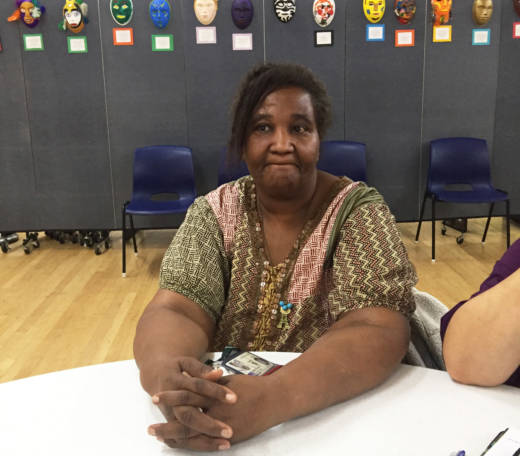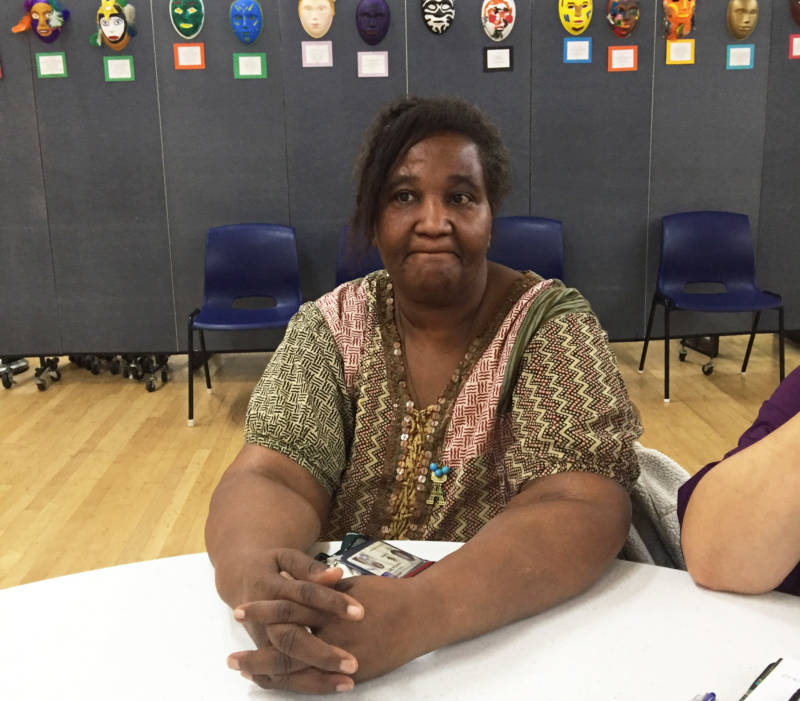While housing and other costs in California have soared in recent years as the economy rebounded from the Great Recession, Brown's monthly check is actually smaller than it would have been eight years ago.
In 2009, as the economy crashed, the state starting slashing public programs to grapple with huge budget shortfalls. The SSI program was one of those on the chopping block.
Starting in 2010, the state began cutting its portion of the monthly payments, then at a high of $233 a month. By 2012, that state portion had fallen by $77 a month to $156 -- the minimum required under federal law.
Janny Castillo works with seniors and others at St. Mary’s Center in Oakland, a nonprofit that provides services to at-risk seniors, including Brown. She said every dollar counts when you're living on a fixed income like Brown.
"Even $10 is a big difference when you are on the streets looking for food. It could mean transportation, it could mean maybe even getting your clothes washed. Can you imagine not being able to wear clean clothes?" she said.
Castillo is among the advocates pushing lawmakers and the governor to increase the state payments to SSI recipients. They note that the program has grown by 72,000 people over the past decade, as more Californians were pushed into poverty by the recession.
As state leaders gear up for this spring's budget season, though, it seems unlikely they'll be able to convince Gov. Jerry Brown to increase the payments.
Brown has struck a note of caution this year: His administration is forecasting a $1.6 billion budget shortfall next fiscal year, and is also bracing for potential cuts to health care and other federally funded programs by Republicans in Congress and President Donald Trump.
H.D. Palmer, a spokesman for the Department of Finance, noted that Brown did modestly increase the state's portion this year, offering SSI recipients the first cost-of-living increase in 12 years.
The bump? Four dollars a month.
Palmer said the governor has worked hard to restore cuts made during the recession and has added back $18 billion a year since 2012 to anti-poverty programs, including expanding health care to the poor, increasing the minimum wage and expanding eligibility for the state's welfare-to-work program.
Palmer says this year's cost-of-living increases for SSI recipients are part of that -- but that it would be hard to go any further.
"If the grant levels were to be restored to their pre-recession levels, the cost to the general fund for that alone would probably run in the neighborhood of several billion dollars," Palmer said. "So the question is where do you take those monies from? Do you take them out of health and human services? Do you take them out of education programs? What other part of the budget do we cut?"
But advocates for the poor argue that SSI recipients are among the state's most vulnerable and deserve to be a priority in state budget discussions.
"The population is predominantly women from communities of color -- black, Latina, Asian-American women -- who have faced the challenges we heard from Wilma," said Andrew Cheyne, director of government affairs for the California Association of Food Banks.
"Maybe they have had to care for family members, maybe they have experienced barriers in the labor force and job market, which has prevented folks from being able to save for an older age, and now they are forced to live on an inhuman amount."
Cheyne said people on SSI all over the state are living on the edge, even in places with lower costs of living.
"In Humboldt County ... 40 percent of food bank clientele are folks who are living on SSI," he said. "Because every month, the monthly check doesn't go far enough and the first thing they cut back on, because they have to, is food."
In the meantime, Wilma Brown is getting help from St. Mary's Center -- they placed her in temporary housing, and offer meals and other support. And she's trying to put a tiny bit away each month so that eventually she can afford to rent a permanent home.


